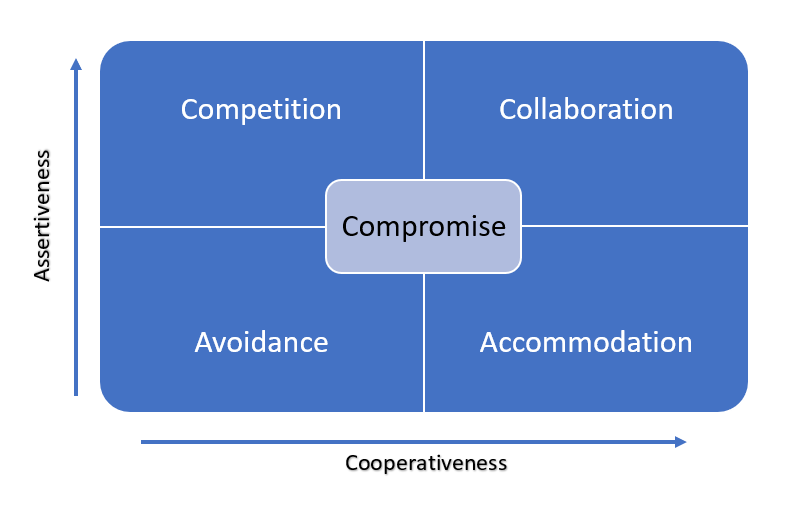What is your Conflict Style?

What is your conflict style? Each of us has a preferred way of engaging in conflict when it occurs. Do you charge forward aggressively into the fray, or do you immediately look for an escape route? Do you try to come together to “work through” the problem, or do you tend to say or do whatever is necessary to make the other person happy?
In order to transform conflict into an opportunity for growth, it is first necessary for us to know how we tend to engage in conflict, so that we can be aware of how we may be contributing to it. Of course, how we engage in any conflict depends greatly on the context. We might be resolute and forceful with a sibling but acquiesce to the demands of a supervisor. We might try to collaborate with community members on planning an event but avoid bringing up a difficult subject with an old friend.
Conflict theorists have observed that how we engage in conflict can be charted according to two variables:
(1) how much we care about the outcome (and are thus willing to be assertive)
(2) how much we care about the relationship (and are thus open to cooperation).
As can be seen in the image above, this framework can be divided into five “conflict styles.” If we care greatly about the outcome but less about the relationship, we tend to adopt a “competition” style. If we care little about the outcome and the relationship is not an important one, we may choose “avoidance.” High relationship importance and low outcome desire leads us to “accommodation.” High values on both the relationship and the outcome make us tend towards “collaboration.” Finally, where these values are balanced but not too strong, we may adopt a “compromise” approach.
Questions of how much energy we have to dedicate to the conflict and how much power we have over the outcome also play a major role—We might avoid conflict where we have little power in a relationship or energy to dedicate to achieving a desired outcome, or we might collaborate where we have more equal power and substantial energy to dedicate to resolving an issue.
There is no “right” or “wrong” to these styles. Each has weaknesses and strengths, making them appropriate for given situations. Is the value of the outcome high, but the value of the relationship low (say, when buying a car from a dealer)? Perhaps a competing style is appropriate. Is the relationship valuable, but not the outcome (say, when a friend asks for a time-consuming favor)? Perhaps accommodation is the right approach. We may view collaboration as the “ideal” conflict style, but its weakness is that it takes the greatest amount of energy and time—we simply cannot collaborate in every situation, nor would it be wise to do so. On the other hand, avoidance may seem a relatively weak approach, but it may be entirely appropriate in some circumstances—and, it can be empowering to recognize when that is so.
At times, our preferred approach may be a mismatch for the situation. We may find it easy to collaborate in a situation where we care little about the outcome or the relationships involved; conversely, we may avoid conflict where we care highly about both. Such mismatched approaches may not be successful and in fact may prolong the conflict. This model can therefore be very helpful not only to identifying our preferred styles, but in calibrating our response to a given situation and recognizing which approaches are most likely to be helpful. It can also help us identify where we tend to over-rely on a style and see that other approaches can be effective as well.
Below is a short quiz designed to help you identify your preferred style (or styles) of conflict. As you take it, think of a conflict that you have experienced recently. How did the approach you took to that conflict affect the outcome? Were you happy with the outcome? Would a different approach also have been effective (or more effective)?
Conflict Styles Quiz: What's Your Approach to Conflict?